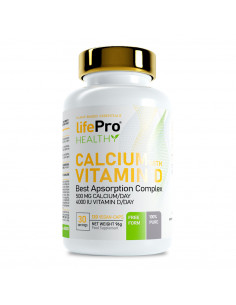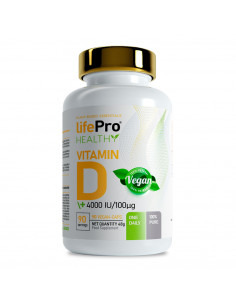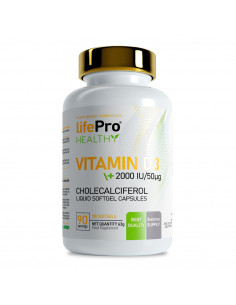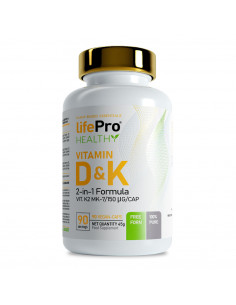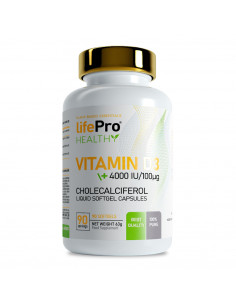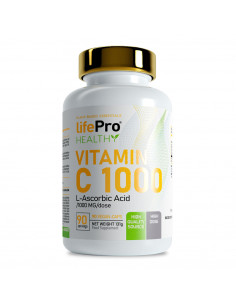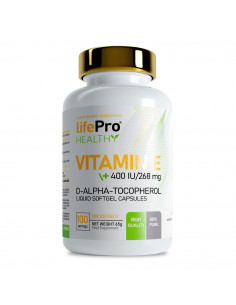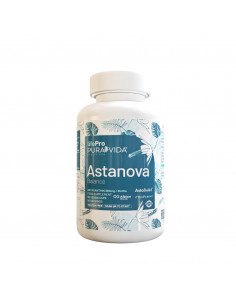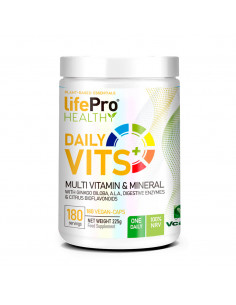Buy Vitamins ONLINE only best brands
Buy QUALITY Vitamins , the largest online offer in the Nutrimarket store. Ideal vitamins to maintain an optimal state. Shipping in 24h.
What are fat-soluble vitamins?
The fat-soluble vitamins are one of the two groups in which we classify vitamins, which have the particular characteristic that they are dissolved in fats and oils, which the body is able to store.
The fact that the body is able to store them means that, unlike the other group of vitamins , the excess is not excreted in the urine. The fat-soluble vitamins will be stored in the liver and in fatty deposits in the body.
The fat-soluble vitamins are: A, D, E and K. They have regulatory and antioxidant functions among many others.
Where are fat-soluble vitamins absorbed?
Fat-soluble vitamins are absorbed in the intestine . For this process to take place, the presence of fat, provided by food (olive oil, avocado, salmon, nuts, etc.) is necessary for them to be absorbed.
These vitamins will then pass into the body's tissues , where they will be stored until the body requires them to carry out the functions in which they are needed.
What are fat-soluble vitamins for?
The fat-soluble vitamins are: A, D, E and K, and each has its own particular functions:
Vitamin A
- Contributes to maintaining eyesight in perfect condition and avoids the risk of cataracts.
- They act as a powerful antioxidant : the most active compounds are carotenoids.
- They improve the immune system and help maintain healthy skin.
Vitamin D
- It is the most common deficiency, especially in people with low sun exposure.
- Contributes to regulating the absorption of calcium in bones and teeth, and therefore, to maintaining their correct state and maintenance.
- Improves the immune system .
- Helps prevent osteoporosis.
Vitamin E
- It has a high antioxidant power that fights against free radicals
- Helps to care for the skin and prevent ageing
- Improves wound healing
- Contributes to maintaining a healthy cardiovascular system
Vitamin K
- It is necessary for the blood to clot and prevent bleeding.
- Helps regulate calcium and protect arteries by preventing calcium deposits from forming in the arteries.
What are water-soluble vitamins?
The water-soluble vitamins are one of the two groups in which we classify vitamins, which have the particular characteristic that they dissolve in water and the body is not able to store them.
The fact that the body is not able to store them means that, unlike the other group of vitamins , their excess is excreted in the urine. For this reason, it is important to consume the required amounts every day.
The fat-soluble vitamins are: vitamin C and all those of the B group. They are necessary for a large number of metabolic functions and energy production.
What are water-soluble vitamins for?
Water-soluble vitamins each have particular functions:
Vitamin C
- It is one of the most important antioxidants in the body.
- Protects against free radicals. Helps to keep the immune system strong.
- Intervenes in the synthesis of collagen.
B group vitamins: in this section we find vitamins B1, B2, B3, B5, B7, B9, and B12.
This large group of vitamins , among many other functions, is responsible for carrying out the metabolism of the 3 macronutrients (proteins, fats and carbohydrates), helps to improve the immune system, the production of red blood cells, and is involved in the growth and development of tissues.
What are the B vitamins used for?
Vitamin B1
- Contributes to carbohydrate metabolism.
- Required for the synthesis of acetylcholine
- Involved in muscle contraction
Vitamin B2
- Necessary for protein metabolism and red blood cell production.
Vitamin B3
- Necessary for the production of certain hormones
- Helps regulate cholesterol levels
- Necessary for energy production
Vitamin B5
- involved in fatty acid metabolism .
Vitamin B6
- Provides energy from food . It is necessary for protein metabolism.
- Regulates blood sugar levels
Vitamin B7
- Involved in the metabolism of the 3 macronutrients
- Necessary for the synthesis of keratin. Maintains the hair in an optimal state.
Vitamin B9
- Important in pregnancy for the development of the baby . Regulates DNA synthesis .
Vitamin B12.
- Involved in the functioning of the nervous system .
- Aids in the production of red blood cells and is necessary for cell division.
- Helps maintain muscle strength and energy.







